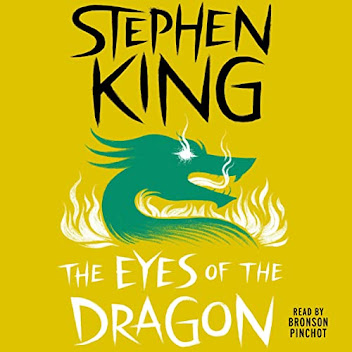The Speed of Dark by Elizabeth Moon
Revealing. Fascinating. Educational. A valuable experience. A+++
Winner of the Nebula Award for Best Novel in 2003.
Have you ever wondered what it might be like to see the world through the perspective of someone whose mind works much different than your own? How different? Do you want to visit a mind that has different opinions and points of view? What about someone whose mind works in a fundamentally different way than yours? How about someone whose mind perceives the world differently than almost everyone you have met in your entire life?
The wonderful thing about a work of fiction is that the reader can be transported into the mind of anyone and see the world as it might be seen from another's point of view. There are no constraints. Elizabeth Moon has done just that in her novel The Speed of Dark.
As it proceeds, The Speed of Dark does bring up many important themes and holds its own on matters such as the rights of the individual to be the person he or she wants to be, tolerance and the inherent value to society of people who think differently. Perhaps most importantly, she does give the reader just a taste of what it might be like to experience the world as a person with autism sees it.
Moon's motivations for attempting this novel are readily apparent. Moon has a son who is a young adult with autism. Already an established, award-winning author of science-fiction, Moon decided to put her investigative energies into learning as much as she could about autism and learning about the world as seen by people with autism. The result is The Speed of Dark, a fascinating novel featuring a man named Lou Arrendale living approximately 35 years in the future.
The strength of the book is that most of it is told from the first-person perspective of Lou, a man who has autism. Lou is very high functioning: he has an apartment, a job and good friends both in and out of the autistic community. He is entirely independent and is incredibly intelligent. Lou lives in a future in which autism has been cured. Children born with autism receive treatment when they are two years old and their brains develop and they are nearly indistinguishable from those that Lou calls `normals.'
However, Lou was too old to receive the treatment when it was developed. Instead, his parents made sure he was enrolled in the best training programs possible so that he could learn what was expected out of a member or society as a whole. Lou was a very good student and he learned to read the social cues that the `normals' pick up and send throughout the day. Rather than instantly recognizing them, Lou must recall them as isolated facts and respond to them with much thought since these gestures, facial expressions and idioms have no innate meaning to Lou. His experiences and confusion bring to mind the experiences of many foreign travelers who must re-learn all of the gestures and social cues of a new culture as they travel. On top of this, Lou struggles with the reality that normals expect him and his friends with autism to respond and behave `normally', even though normals themselves often do not behave normally.
We learn about Lou and his life and the difficult choice he must make when he is offered the chance to change his life forever and take a part in an experimental surgery to make his brain 'normal.' Guaranteed to make you think.
One of the best books I have read - period.
I rate this book 5 stars out of 5. Highly recommended.
This book can be found in multiple formats on Amazon.com here: The Speed of Dark by Elizabeth Moon.
Reviewed on May 29, 2006.
The wonderful thing about a work of fiction is that the reader can be transported into the mind of anyone and see the world as it might be seen from another's point of view. There are no constraints. Elizabeth Moon has done just that in her novel The Speed of Dark.
 |
| Elizabeth Moon |
As it proceeds, The Speed of Dark does bring up many important themes and holds its own on matters such as the rights of the individual to be the person he or she wants to be, tolerance and the inherent value to society of people who think differently. Perhaps most importantly, she does give the reader just a taste of what it might be like to experience the world as a person with autism sees it.
Moon's motivations for attempting this novel are readily apparent. Moon has a son who is a young adult with autism. Already an established, award-winning author of science-fiction, Moon decided to put her investigative energies into learning as much as she could about autism and learning about the world as seen by people with autism. The result is The Speed of Dark, a fascinating novel featuring a man named Lou Arrendale living approximately 35 years in the future.
The strength of the book is that most of it is told from the first-person perspective of Lou, a man who has autism. Lou is very high functioning: he has an apartment, a job and good friends both in and out of the autistic community. He is entirely independent and is incredibly intelligent. Lou lives in a future in which autism has been cured. Children born with autism receive treatment when they are two years old and their brains develop and they are nearly indistinguishable from those that Lou calls `normals.'
However, Lou was too old to receive the treatment when it was developed. Instead, his parents made sure he was enrolled in the best training programs possible so that he could learn what was expected out of a member or society as a whole. Lou was a very good student and he learned to read the social cues that the `normals' pick up and send throughout the day. Rather than instantly recognizing them, Lou must recall them as isolated facts and respond to them with much thought since these gestures, facial expressions and idioms have no innate meaning to Lou. His experiences and confusion bring to mind the experiences of many foreign travelers who must re-learn all of the gestures and social cues of a new culture as they travel. On top of this, Lou struggles with the reality that normals expect him and his friends with autism to respond and behave `normally', even though normals themselves often do not behave normally.
We learn about Lou and his life and the difficult choice he must make when he is offered the chance to change his life forever and take a part in an experimental surgery to make his brain 'normal.' Guaranteed to make you think.
One of the best books I have read - period.
I rate this book 5 stars out of 5. Highly recommended.
This book can be found in multiple formats on Amazon.com here: The Speed of Dark by Elizabeth Moon.
Reviewed on May 29, 2006.











Comments
Post a Comment